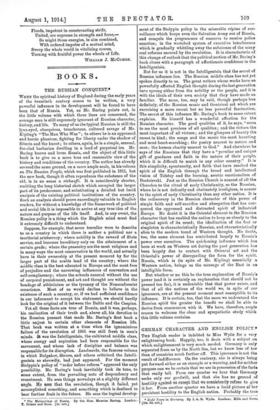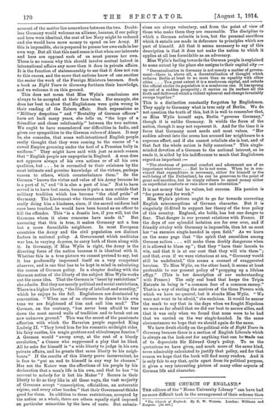GERMAN CHARACTER AND ENGLISH POLICY.•
THE English reader is indebted to Miss Wylie for a very enlightening book. Happily, too. it deals with a subject on which enlightenment is very much needed. Germany is only separated from us by the North Sea, but we know less of her than of countries much further off. This ignorance is not the result of indifference. On the contrary, she is always being put forward either as an example or a warning, and for neither purpose can we be certain that we are in possession of the facts that really tell. From one quarter we hear that Germany seeks only our goodwill, and that she has no ground of hostility against ns except that we consistently reline to give it her. From another quarter we have a lurid picture of her persistent hostility to the English nation. Probably the true • Eight Years in Germany. By L A. H. Wylie. London: Mills and Boon. [10e. 6d. net.] account of the matter lies somewhere between the two. Doubt- less Germany would welcome an alliance, because, if our policy and hers were identical, the cost of her Navy might be reduced and she would have more money to spend on her Army. If this is impossible, she is prepared to pursue her own ends in her own way. But all that this need mean is that when our interests and hers are opposed each of us must pursue her own. There is no reason why this should involve mutual hatred in international affairs any more than it does in private affairs. It is the function of statesmanship to see that it does not run to this excess, and the more that nations know of one another the easier the work of the Foreign Ministers becomes. Such a book as Eight Years in Germany furthers their knowledge, and we welcome it on this ground.
This does not mean that Miss Wylie's conclusions are always to be accepted at their face value. For example, she does her beat to show that Englishmen were quite wrong in their reading of the Zabern affair. Such expressions as "Military despotism " and " Brutality of German officers" have set back many years, she tells us, "the hope of a friendlier and closer relationship" between the two nations. We ought to have remembered our difficulties in India, and given our sympathies to the German rulers of Alsace. It may be, she concedes, that some well-intentioned English people really thought that they were coming to the rescue of " a cowed Empire groaning under the heel of a Prussian bully in uniform." They might have said with just as much reason that " English people are unpopular in England. A man does not approve always of his own actions or of all his own qualities, but . . . he is reconciled to their existence by the most intimate and genuine knowledge of the virtues, perhaps unseen to others, which counterbalance them." So the German "knows the virtue and value of his Army because he is a part of it," and "it is also a part of him." Not to have served is to have lost caste, because it puts a man outside that military tradition which has become "the chief pride" of Germany. The Lieutenant who threatened the cobbler was really doing him a kindness, since, if the sacred uniform had once been touched, he would have been bound as an officer to kill the offender. This "is a drastic law, if you will, but the Germans whom it alone concerns have made it." But assuming that this is true, it makes Germany not a less but a more formidable neighbour. In most European countries the Army and the civil population are distinct factors in national policy. A Government which meditates war has, in varying degrees, to carry both of them along with it. In Germany, if Miss Wylie is right, the Army is the directing force of the nation because it is identical with it. Whether this is a true picture we cannot pretend to say, but it has profoundly impressed itself on a very competent observer, and is one that has to be kept in mind in calculating the course of German policy. In a chapter dealing with the German notion of the liberty of the subject Miss Wylie works out the same idea. That the German is "beset by restrictions " she admits. But they are merely political and social restrictions, There is a higher liberty, " the liberty of intellect and morality," which he enjoys to the full. Englishmen are dominated by convention. " When one of us chooses to dance to his own tune we are frightened of him and call him mad." The German, on the contrary, "has never been afraid to tear down the most sacred walls of tradition and to break out on new unknown ground." This was the secret of the passionate affection with which the Bavarian people regarded King Ludwig II. " They loved him for his romantic midnight rides his fairy castles, his magic grottoes and chivalresque fancies.' A German would "sweep away, at the cost of a bloody revolution," a Censor who suppressed a play that he liked. All he asks for himself is "a wide liberty to judge in his own private affairs, and he grants that same liberty to his neigh- bours." If the results of this liberty prove inconvenient, he is free to "put an end to himself in any way he chooses." Has not the Kaiser won the affections of his people by his declaration that a man's life is his own, and that he has "to account to nobody for it but his Maker " ? Secure in their liberty to do as they like in all these ways, the vast majority of Germans accept "conscription, officialdom, an autocratic regime, and every other burden " that their Government thinks good for them. In addition to these restrictions, accepted by the nation as a whole, there are others equally rigid imposed on particular minorities by the laws of caste. But submis-
sions are always voluntary, and from the point of view of those who make them they are reasonable. The discipline to which a German submits is iron, but the personal sacrifices which it entails are made in deference to principles which are part of himself. All that it seems necessary to say of this description is that it does not make the nation to which it applies at all less formidable as an adversary.
Miss Wylie's feeling towards the German people is explained to some extent by the place she assigns to their capital city :-
"Decentralisation in Germany is not merely a matter of govern- ment—there is, above all, a decentralisation of thought which reduces Berlin at least to no more than an equality with other cities. . . . To a great extent it is a mushroom capital, and outside the official circles its population is a mushroom one. It has sprung up out of a sudden prosperity ; it carries on its surface all the froth and driftwood which a violent upheaval and change invariably sweeps together."
This is a distinction constantly forgotten by Englishmen. They apply to Germany what is true only of Berlin. We do not question the truth of this, but it is well to remember that, as Miss Wylie herself says, Berlin "governs Germany," though it is unlike Germany. It wields the force of the nation, though it may not represent it. And for the time it is
force that Germany most needs and most values. " Her sudden advent into the arena has aroused her neighbours to a supreme effort, and if she cannot retaliate she is lost, and of that fact the whole nation is fully conscious." This single- minded devotion of a German to the national interest, as be reads it, is aided by his indifference to much that Englishmen regard as important
The etceteras of personal comfort and adornment are of no importance whatever.... But he is not mean. When he is con- vinced that expenditure is necessary, either for himself or the well-being of the Fatherland, he can be generous to the point of great self-sacrifice, but he simply refuses to spend money either on superficial comforts or vain show and ostentation."
It is not money that he values, but success. His passion is "for power and for work."
Miss Wylie's picture ought to go far towards correcting English misconceptions of German character. But it is singularly ill-fitted to support her theory of the true policy of this country. England, she holds, has but one danger to fear. That danger is our present relations with France. If the days of our splendid isolation are for ever over, and if friendly rivalry with Germany is impossible, then let us meet her "as enemies single-handed in open field." As we learn on the same page that "the spirit that smoulders among German sailors . . . will make them doubly dangerous when it is allowed to blaze up "; that they "have their laurels to win, and that it is at our cost that they will win them"; and that, even if we were victorious at sea, "Germany would still be undefeated," this seems a counsel of exaggerated heroism. To Miss Wylie, on the other hand, it seems at least preferable to our present policy of "propping up a lifeless effigy." (This is her description of our understanding with France.) The only real bond that keeps the Triple Entente in being is "a common fear of a common enemy." That is a way of stating the motives of the three Powers with which we have no quarrel, but it shocks Mies Wylie. " We were not wont to be afraid," she exclaims. It would be nearer the mark to say that in the days when we fought Napoleon we were so far afraid that we did our best to secure allies, and that it was only when we found that none were to be had that we carried on the war single-handed. In the same circumstances we hope that we should again do the same.
We have dwelt chiefly on the political side of Eight Years in Germany because there is a section of English Liberals which is always on the look-out for anything that can belisade use of to depreciate Sir Edward Grey's policy. To us the quotations we have given, and much more of the same kind, seem admirably calculated to justify that policy, and for that reason we hope that the book will find many readers. And it is only fair to say that, quite apart from its political purpose, it gives a very interesting picture of many other aspects of German life and character.



































 Previous page
Previous page